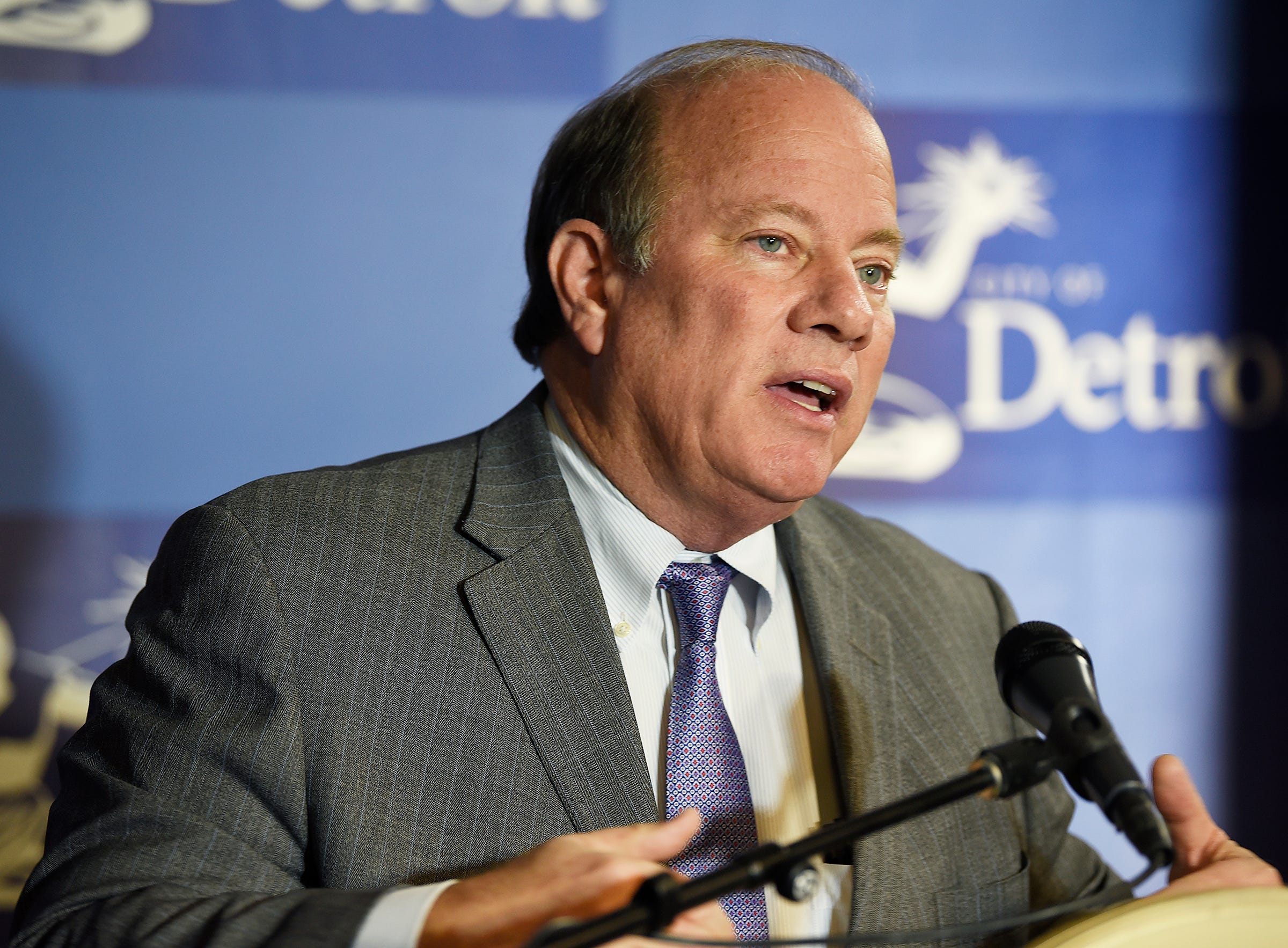Duggan to lawmakers: Michigan auto insurance system ‘morally indefensible’
 Jonathan Oosting
Jonathan Oosting
Lansing — Detroit Mayor Mike Duggan on Wednesday urged lawmakers to reform Michigan’s no-fault auto insurance law by fixing a “morally indefensible” system that has produced the highest rates in the nation.
Duggan made his case before the Senate Insurance and Banking Committee and told reporters after the hearing he is optimistic for action. The Detroit Democrat cited “very, very different dynamics” in the Legislature than last term, when a cost-cutting plan he backed died in the state House.
Michigan’s unique requirement that auto insurance policies provide unlimited lifetime medical benefits is the main driver of sky-high auto insurance rates, accounting for 42 percent of the average premium, up from 6 percent of premium costs when the law was created in 1972, the mayor said, suggesting motorists should have the choice to purchase lower-coverage plans.
“In Michigan, you either pay for the most expensive and comprehensive insurance in America, or you drive without coverage,” Duggan said. “And 20 percent of Michigan residents, the highest in the United States, are driving uninsured.”
The powerful Detroit Democrat also blasted what he called an “unholy alliance” between medical providers who charge auto insurers more than health insurers and attorneys who sue insurance providers and then take a cut off the top of any subsequent bill payments.
Michigan law requires auto insurers to pay “usual and customary” charges even though health insurers often negotiate lower rates with hospitals. A computerized brain scan can cost Medicare $262, a private insurer $419 and an auto insurer $1,821, said Duggan, the former CEO of the Detroit Medical Center.
While no-fault auto insurance law was designed to reduce lawsuits, experts say the opposite has happened. Auto insurance claims accounted for 57 percent of all civil lawsuits in Wayne County in 2017, 52 percent in Macomb County and 42 percent statewide, Duggan said.
For hospitals and attorneys, “it’s in their interest to drive up these bills as high as they can, because they both benefit,” he said.
Supporters of Michigan’s no-fault auto insurance law say catastrophic injuries are rare in car crashes, but guaranteeing lifetime coverage for injured motorists prevents them from being forced into substandard Medicaid coverage or personal bankruptcy.
John Cornack, president of the Coalition Protecting Auto No-Fault, criticized Duggan's testimony in a statement, arguing that allowing "choice" in personal injury protection would "deprive Michigan citizens of essential care," force families into bankruptcy and create a "hidden tax" by forcing injured motorists onto Medicaid.
"That’s a good deal for insurance companies and a bad deal for everyone else," Cornack said. “There’s a better way to lower rates — through effective rate regulation, prohibiting the use of nondriving rating factors when setting rates, implementing a fee schedule for health care providers, cracking down on fraud, and enacting other common-sense, bipartisan reforms.”
But majority Republicans on the Senate panel appeared sympathetic to Duggan’s arguments and said auto insurance rates were one of the most common issues that voters raised during the 2018 election cycle.
Michigan has “criminalized the act of being poor” by mandating auto insurance despite rates that are too high for many motorists to pay, said Sen. Tom Barrett, R-Potterville.
And requiring elderly motorists on Medicare to pay for those health benefits amounts to a “tax on seniors,” said Sen. Aric Nesbitt, R-Lawton.
'Shock waves'
Duggan and a group of Detroit motorists are suing the state over the no-fault auto insurance law and are seeking an order for the Legislature to cut rates within 60 days or revert the state to a tort-based system in which an at-fault driver would be responsible for damages, medical expenses and other costs resulting from a crash.
A federal judge last week called Michigan’s no-fault law “shameful,” a comment that sent some “shock waves” through Lansing, Duggan said.
Detroit businessman Dan Gilbert has also threatened to pursue a ballot initiative if lawmakers don’t act, but “that’s a very difficult way to go,” Duggan told reporters after the hearing.
“I think the lawsuit is ultimately the winning play,” he said. “I don’t see any way a judge can conclude that Michigan care insurance rates are fair and equitable.”
The state House in 2017 rejected a plan backed by Duggan and then-House Speaker Tom Leonard, a Republican, that would have given motorists the choice to buy reduced-coverage auto insurance policies and would have created a fee schedule to cap medical provider rates.
Duggan said he’ll back legislation again this term, provided he sees proof it will reduce rates by at least 20 percent. He'd also support a plan to prohibit insurers from setting rates based on nondriving factors, such as zip codes, but Duggan said mandatory personal injury protection is the main "problem" that is driving up costs.
“Don’t give me a bunch of nonsense about a fraud authority and a few other things that might move it a couple of percent and claim we did reform, because people are just going to be pissed off when they see their bill in six months and they see it didn’t do the job,” Duggan said. “And I think most legislators are now coming around to that view.”
While the House voted down the 2017 plan, the state Senate was actually the “formidable obstacle,” Duggan said, suggesting it was difficult to win House support once it became clear the Senate would not vote on the legislation.
New Senate Majority Leader Mike Shirkey, R-Clarklake, has made auto insurance reform a top priority this term. State Sen. Lana Theis, who sponsored the last House plan, is now chairing the Senate Insurance and Banking Committee.
Several Detroit Democrats that Duggan supported won election to the upper chamber, including Sens. Sylvia Sanatana, Adam Hollier and Marshall Bullock, who also sits on the insurance committee.
“The dynamic is very, very different than it was even a year ago,” Duggan said.
Senate Democrats have “mixed” opinions on Duggan’s continued push to provide motorists with coverage choices instead of requiring policies to guarantee unlimited lifetime medical benefits, said Minority Leader Jim Ananich of Flint.
If the state does provide choice and creates a fee schedule for medical providers, Ananich said the state also should treat auto insurers similar to electric utilities by requiring them to go before state regulators to justify price increases.
“If we’re going to lower rates, it needs to be for the long term, not a one-year bump,” he said. “The last thing I’d want to do is see a bill that passes that dramatically reduces people’s ability to get the care they need.”
Shirkey said Wednesday it “would be a shame if we didn’t eliminate unlimited” medical benefits now mandatory in auto insurance policies, and House Speaker Lee Chatfield, R-Levering, said consumers deserve choice.
“We call that freedom, and this is America,” Chatfield said. “I do believe consumers need choice, but I would tell you this: I am not starting off the no fault discussion with 'We need this or we need that.'”
In Detroit, the stars are also aligned to push reform, including business leaders who understand the city is “never going to fully come back” if the state does not cut car insurance rates, Duggan said.
“I’ve got an interesting situation where poor folks who have been kept from jobs because they can’t drive legally and the wealthiest business people who want to see the city come back are all allied into a single position. It’s not often you see that.”
joosting@detroitnews.com